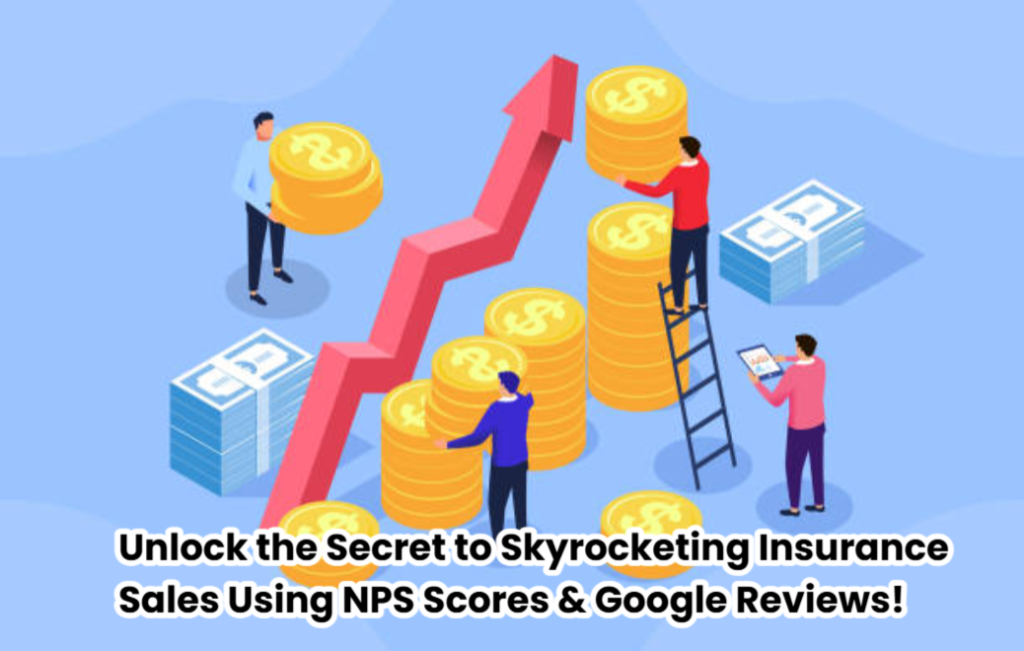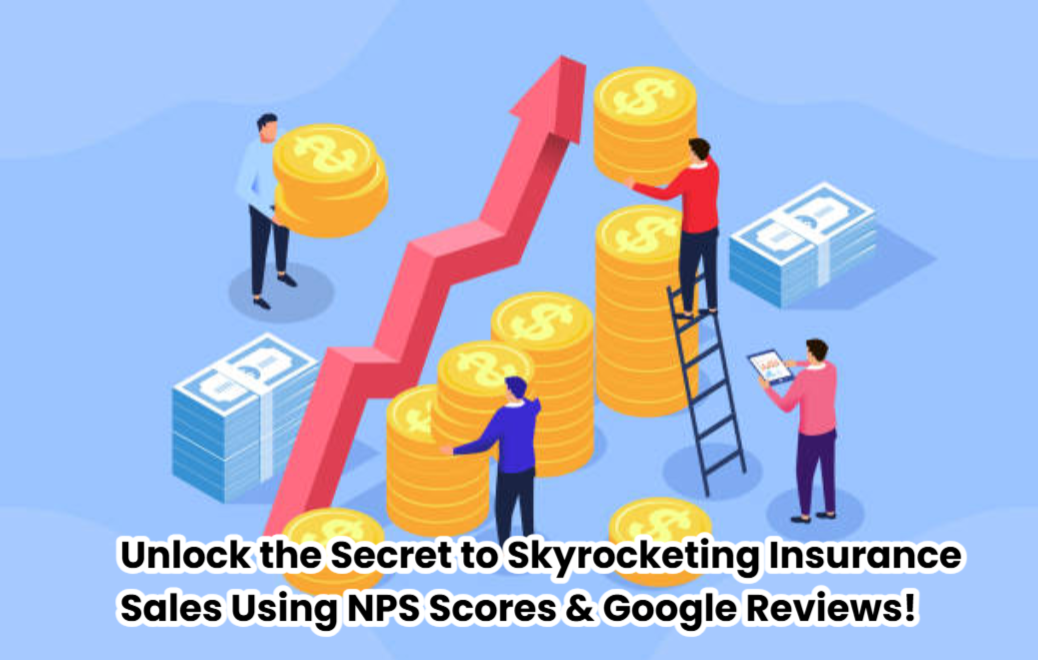Imagine this: A loyal policyholder visits your website to check on their recent claim. They have been with your agency for years. Still, they get moved from one department to another. They are often asked for their policy number. This leaves them feeling frustrated. Another customer is upset about a recent rate increase. They share their frustration on Google Reviews. Your agency does not respond, and within days, they switch to a competitor that listens and anticipates their needs.
This is the reality for many insurance agencies today. Customers communicate all the time. They use emails, phone calls, reviews, and their website interactions. The big question is: Is your agency truly listening?

Why NPS Scores & Google Reviews Matter More Than Ever
Before we dive into how to use customer feedback effectively, let’s break it down.
Net Promoter Score (NPS) is a simple yet powerful metric that measures customer loyalty. It is based on a single question: “On a scale of 0-10, how likely are you to recommend our services to a friend or colleague?” Based on their responses, customers fall into three categories:
- Promoters (9-10): Highly satisfied customers who will likely recommend your agency.
- Passives (7-8): Moderately satisfied but unenthusiastic customers who could switch to a competitor.
- Detractors (0-6): Unhappy customers who may spread negative feedback and churn.
Google Reviews give you public insights into your customer experiences. Google Reviews are different from NPS because they impact potential clients. When people look up your agency online, these reviews play a big role. A high rating and positive reviews can establish credibility and trust, while negative reviews can deter new business.
But here’s the key takeaway: It’s not just about collecting ratings and feedback. It’s about how you act on them.
Understanding Customer Intent Through Feedback
Every review and survey response is an opportunity to understand customer intent. When a client gives you an NPS score or leaves a review, they are telling you what is working well and what needs improvement. In the insurance world, trust and reliability matter most. This information is essential.
Segment Your Customers Based on Their NPS Scores
- Engage with Your Promoters
- These are your most satisfied clients. Don’t let their enthusiasm go unnoticed. Ask them to leave positive Google Reviews, participate in testimonials, or refer friends and family. Offering a referral incentive could also encourage them to promote your agency further.
- Use their feedback to find what you do well. Then, strengthen those areas in your marketing and customer service.
- Address Your Detractors Before They Leave
- Negative feedback should not be ignored. Instead, it should be seen as a chance to turn an unhappy customer into a loyal one. Follow up with detractors personally. Ask them what went wrong, acknowledge their concerns, and offer solutions.
- Many customers will update or remove negative reviews. They do this when their concerns are taken seriously and resolved well.
- Convert Passives into Promoters
- Passives may not be dissatisfied, but they aren’t excited about your service either. Engage customers with personalized messages, special offers, or better communication. This helps boost their satisfaction and loyalty to the brand.
Turning Negative Feedback into Actionable Improvements
A negative review or low NPS score doesn’t have to hurt your agency’s reputation—it can be a roadmap for improvement. If customers frequently mention delays in claim processing, for example, it’s a sign that your workflow needs to be optimized.
Here’s what you can do:
- Automate claim status updates so clients don’t have to call repeatedly.
- Offer self-service options so they can check their policy details and claim progress online.
- Improve communication by training agents to be more proactive and empathetic in their responses.
By addressing these issues, you’re not just improving your service—you’re showing customers that their feedback matters.
Leveraging Positive Feedback for Sales Growth
Positive feedback is an untapped resource that many agencies fail to utilize effectively. A satisfied customer is not just a loyal client—they’re a potential advocate for your business.
- Feature testimonials prominently on your website, social media, and marketing materials.
- Ask Promoters to write Google Reviews. This helps your agency look credible and grow its online presence.
- Create referral programs that reward loyal clients for bringing in new business.
People trust real customer experiences over advertising, so use their words to build trust and attract new leads.
Transforming Feedback into Marketing Content
NPS scores and Google Reviews can be powerful marketing tools. Here’s how to maximize their impact:
- Turn positive reviews into social media posts showcasing real customer experiences.
- Use feedback in email marketing campaigns to highlight success stories and build credibility.
- Develop video testimonials featuring satisfied policyholders sharing their stories.
Address Concerns Proactively
How your agency handles negative feedback can make or break your reputation. A clear way to handle customer issues can turn unhappy clients into loyal customers.
Best Practices for Managing Negative Feedback:
- Respond quickly (within 48 hours) to show you take concerns seriously.
- Acknowledge the issue and offer a clear resolution.
- Follow up after resolution to ensure the customer is satisfied.
Potential clients often read negative reviews before making a decision. How your agency solves problems with professionalism and empathy can build trust.
Boosting Your Online Reputation
Your Google Reviews are one of the first things prospective customers see. To maintain a strong online reputation:
- Regularly request reviews from satisfied clients.
- Update your Google Business profile with fresh testimonials.
- Monitor and respond to all reviews, both positive and negative.
Final Thoughts: Actively Listen, Engage, and Grow
NPS scores and Google Reviews are more than just numbers—they are a reflection of your agency’s strengths and weaknesses. Agencies that act on customer feedback keep more clients, draw in new business, and build a solid brand reputation.
Are you actively listening to your customers? If not, now is the time to start. Your clients share important insights. Use these to build better relationships, improve service, and grow your agency’s success.
Must read:
- Shocking Truth About Deductibles, Premiums & Coverage Limits – Are You Overpaying?
- From Private Equity to IPO: 3 Game-Changing Capital Strategies Every Insurance Brokerage Must Know!
- Shocking Truth About Liability Insurance: How to Shield Your Business from Costly Lawsuits!
FAQs: Maximizing NPS & Google Reviews for Insurance Success
u003cstrongu003eWhat is NPS (Net Promoter Score) and why is it important for my insurance agency?u003c/strongu003e
NPS is a metric that measures customer loyalty by asking how likely they are to recommend your services to others. It helps you gauge overall satisfaction and identify areas for improvement.
u003cstrongu003eHow do Google Reviews impact my insurance agency?u003c/strongu003e
Google Reviews shape your online image. They attract potential clients and boost your search rankings. Positive reviews draw in more customers. Also, handling negative feedback shows your commitment to excellent service.
u003cstrongu003eWhat’s the difference between NPS and Google Reviews?u003c/strongu003e
NPS is a private measure of customer loyalty. In contrast, Google Reviews are public feedback that can sway new clients’ choices. Both provide valuable insights but serve different purposes.
u003cstrongu003eHow can I use NPS feedback to improve my agency’s customer experience?u003c/strongu003e
You can categorize customers into three groups: Promoters (9-10), Passives (7-8), and Detractors (0-6). This helps you tailor follow-ups, fix problems, and boost customer service. As a result, you improve retention and satisfaction.
u003cstrongu003eWhat should I do if I receive negative NPS scores?u003c/strongu003e
Negative feedback is an opportunity for improvement. Identify common complaints, address them quickly, and reach out to unhappy customers. Fix their issues before they switch to another provider.
